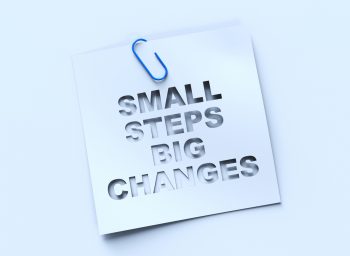
Ever feel overwhelmed by the thought of making a significant change? Whether it’s in your personal life, career, or overall well-being, the idea of transforming yourself can be daunting. But here’s a secret — big changes often start with small actions.
Understanding how minor adjustments can lead to monumental impact is key.
Let’s take a moment and think about how tiny steps can drive significant changes and offer actionable insights to help you get started.
The Power of One Small Step
The concept of “taking small steps” suggests that small, seemingly insignificant changes can result in substantial differences. In personal growth, this means that a minor change in your daily routine, like getting up 15 minutes earlier, can cascade into more productive days and improved mental well-being.
You might think that making a radical change or trying to change a lot of habits all at once, is the fastest way to achieve your goals. However, it’s more often the small, consistent actions that bring about lasting change. For example, committing to reading just 10 pages of a book each night can result in finishing several books a year, vastly expanding your knowledge base.
I am always turning people toward James Clear when talking about habit change. He’s the author of “Atomic Habits,” and he emphasizes that 1% improvements are what will add up over time. By focusing on being 1% better each day, you’ll see exponential gains over time.
Set Achievable Goals
- Large goals can be intimidating and hard to measure. Instead, break them down into micro-goals. Instead of aiming to lose 50 pounds, focus on losing 1-2 pounds each week.
- For example, when reading through your Winslow Assessment feedback, which is very robust, I always advise that you break down your goals into three behaviors that are strengths and identify how you’re going to capitalize on them. Then identify three behaviors that are potential liabilities and how you’re going to modify them. This makes the large amount of information obtained through Winslow feedback much more manageable and helps keep you motivated.
- Use tools like journals, apps, or spreadsheets to monitor your progress. Seeing tangible evidence of your efforts can spur you on and offer insights into what’s working or what needs adjustment.
Building Better Habits
So you’ve identified some habits you want to change or add. I love the concept of habit stacking (which I learned in “Atomic Habits” and then again in “Habit Stacking: 127 Small Changes to Improve Your Health, Wealth, and Happiness”). Habit stacking involves adding a new habit to an existing one. I have a habit of drinking coffee (a latte) every morning, and I combine it with a new habit of taking my collagen and vitamins. This has made my new habit much easier to adopt.
Start with sticking to a simple morning and evening routine and gradually add elements that align with your goals.
Additional Helpful Tips:
- Daily Exercise: Make sure you’re incorporating small amounts of exercise into your daily routine. Even a 10-minute walk can boost your energy levels and improve your overall health.
- Mindfulness and Meditation: Every morning, I need about 30+ minutes for planning my day, mindfulness, and/or meditation. When I skip this because I’m running late, my day does not run as smoothly. This one small habit will reduce your stress and improve your mental clarity.
- Journaling: Keep a daily journal to track your thoughts and emotions. It’s so important to record insights that are important to us. This simple practice can provide an outlet for your mental state, which, in turn, will help you manage stress.
Take courage — big changes don’t happen overnight; they’re the result of consistent, small actions taken over time.
By breaking down your goals into manageable steps, you will create lasting change in various aspects of your life. Remember, the key lies in starting small and staying consistent.



